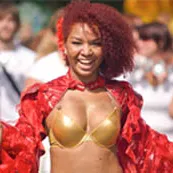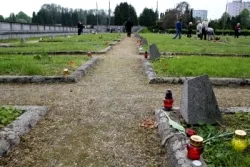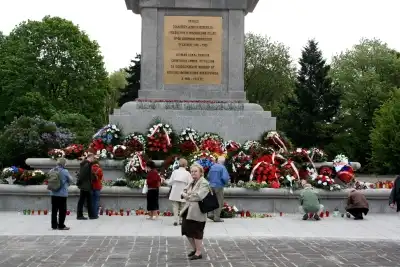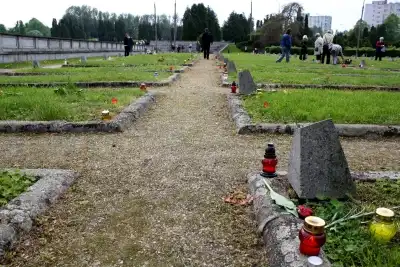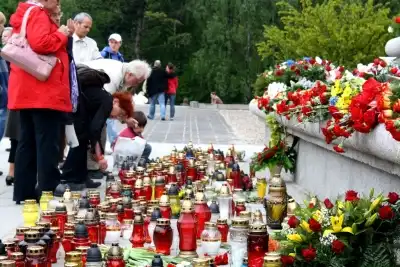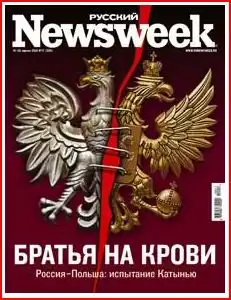Не было бы счастья, да несчастье помогло (nie byloby szczast’ja, da niesczast’e pamaglo) – as a Russian proverb has it. Good luck in bad luck – repeats a Polish one. In February 2008 I gave the Polish Television Puls the interview concerning the Russian premier of “Katyń” – the film of Andrzej Wajda.. I told them it would be rather a private show but it would surely arouse interest. Two years elapsed and “Katyń” was emitted on Russian State TV two times in the space of two weeks. One could discuss Polish-Russian relations without end. It is possible to talk about politics, cultural relations and interpersonal relations. But it was only after the crash in Smoleńsk that one nation has understood the other. On 19 April Russian Newsweek was published and its main article was untitled 'Brotherhood in blood. Russia and Poland tested by Katyń'. On the cover we can see the Polish eagle clipped together with the Russian one. All the articles are full of hope that this tragedy will help us build happy future. Probably for the first time the Polish and the Russian press are unanimous.
After the crash many people were expecting a new stage of political war between the two countries, that Poles and Russian would find fault with each other. Directly after the tragedy I got a few mails from my Moscow friends who were expressing their sympathy as well as some apprehension pertaining to the new stage of a conflict. The majority of Russians were sure that Poles would find them guilty. Why, they knew from the media that Poles were blaming Russians for everything. And what is the reason for such a state of affairs? Few Russians know about Poland more than it can be read in history manuals or seen on TV. Simply speaking, they buy a “ready image” of Poland, which is not always real. Yet, luckily, things have taken a new turn – politicians of both countries and boards of inquiry have begun to collaborate, the media have started to use the same language and common people express their whole-hearted sympathy.
Polish TV showed Russians who, crying, feel for the Polish people, Russians who are bringing flowers to the place of the tragedy or to Polish consulates. Russians emit the film “Katyń” immediately after the tragedy despite it was already shown a couple of days before. For the first time ambassador Jerzy Bahr is invited to Wladimir Pozner’s program, which is displayed in the priming-time, in the first channel of Russian State TV. Poles saw the real face of Russians while Russians, for the first time, could familiarize themselves with the Polish point of view.
Newsweek Russia publishes the interview with Henryk Samsonowicz, historian and former minister of education in Poland. Samsonowicz says he is impressed by the way common Russians react. He sees in it an opportunity for an agreement, reminds that without Russian culture Europe would be different. He also calls to remembrance how Poland suffered under the Tatarian-Mongolian yoke and at the time of Stalin. In Newsweek Elena Czernienko, among other things, presents reports from Warsaw streets, she tells about different opinions on Kaczyński’s funeral on the hill of Wawel, which seem to be incomprehensible to common Russians – 'Why are you against Kaczyński’s burial in Wawel? Among us no one even talks about it.' – my friends told me.
Not only Newsweek but also magazine Wlast put on its cover the leading topic of this issue – 'The confounded place' whereas Ogoniok placed the photo of lamps burning in front of the Presidential Palace in Warsaw. Ogoniok quotes as well Adam Michniks’s article from Gazeta Wyborcza – 'Thank you my Brothers Russians for your sympathy, for comprehension'. 'We also thank you Brothers Poles that you’ve heard us' – replies a Russian author in Ogoniok. The journalist Paweł Szeremet in the article 'Startled Poland' mentions by name the members of Katyń families, who died in the crash. He writes that Poles didn’t expect such a reaction of Russians. To me such a reaction is quite obvious, maybe because I know Russians not from books or TV programs. This is my nation. I’m sure we would react in like manner to every tragic happening on this scale.
The RIA Novosti agency on its website (www.rian-ru/poland/index.html) suggested the readers writing a letter of sympathy to Poland. There are yet thousands of letters not only from Russia but also from Ukraine, Armenia, Kazakhstan, Moldova. I’ll give you a few quotations:
Wiktor from Moskwa: 'I’ll be honest; I didn’t like Kaczyński for many reasons…We all were bitten. Poles by Russians, Russians by Poles. I didn’t accept it, I didn’t understand it or I didn’t want to. And all of a sudden – death. Terrible death. And the mind has been turned upside down. I felt I had lost not my friends but my family…I was looking at Polish websites whose colours were changing into black and white. Some time will pass. Life will revert to normalcy. From the bottom of my heart I want our black-white relationships to be lively, that is to say, colour. Let’s forgive each other everything and start form the beginning. I wish us luck.'
Tatiana from Saint Petersburg writes: 'In our family we’ve taken the Polish tragedy as our own one. We have relatives in Poland. When we knew about the accident, we remained shocked. We were catching all information about the inquiry. We were afraid that there would be a grudge against Russia. I’m sure our country did everything as it should have. I believe this tragedy will help our countries come closer to each other. After all, we are not enemies. We have never been. And the media have to help us. Work with the young people is especially important. Maybe we can organize common sections of war archeologists. Or common guards of honour at monuments commemorating the missing of the World War II or just meetings with combatants.'
But is not only Russian words that can be found on this website. The website is visited also by the Polish people who feel obliged to thank: 'I thank both the authorities of the Russian Federation and all the citizens. I believe that our nations will enter into friendly relations and will be even greater friends in the future' – says Paweł from Gdańsk.
Paweł from the East of Poland: 'Being Pole, I want to thank you for these letters. On reading them I was moved while usually one has to try hard to touch me. I wish you all good health'.
It is also essential that, after the tragedy, numerous articles on Polish topics appeared. In number 15 of the magazine Wlast (….) there are three articles: on Lech Kaczyński’s life and political career, on the tragedy and on the Katyń crime. The problem of the massacre in Katyń had never been so widely discussed among Russians before the tragedy. Even those little interested in history are conscious of what happened 70 years ago. The Russian press reminds that in 1990 Gorbaczow delivered to Poland the first folder with documents pertaining to the crime of Katyń, that Boris Jelcin apologized to the Polish people for this slaughter. Now it’s time to make things clear. 'Do Poles treat you differently after the tragedy?' – asked me a journalist from Ukrainian TV. I want to reassure you that both Poles and Russians are able to distinguish State politics from the very nation. No matter how difficult were the relations between Poland and Russia, I’ve never experienced accusations or discrimination due to my nationality. But now even more Polish people have understood that Russians and the authority or politics are completely different things.
The evaluation of actions undertaken by Russians undoubtedly is positive, in both the Polish and Russian media. But the most important thing is that we Russians are able to feel sorry for you Poles; that we’re able to write sincere 'letters to Poland' and that you are able to answer us with 'spasiba' and kindle 'lights for Russians', what would be unthinkable before the crash.
On 9 May at the cemetery of Soviet soldiers in Warsaw I met Polish combatants. I was at the cemetery after the celebrations and saw there a few people well-known all over Poland, who had come to pay homage to Soviet soldiers, already after switching off cameras. Both my grandfathers fought in this war and both survived. My one grandmother was taken to Germany for forced labours. The second grandma worked as a small child, helping to build the victory, and to my family this feast was the most important one. We were gathering at the table, the grandfather was putting on his medals and telling us stories and we were singing songs about airmen (my grandfather was an airman). Never in our house did we talk about Stalin and other commanders of the Red Army. We were always talking about common winning soldiers, my grandfather’s friends. The Warsaw inhabitants, who came on 9 May to the cemetery in Żwirki st., were passing from tomb to tomb, reading soldiers’ names and kindling lights. The most flowers and lights were on anonymous tombs. Poles saw the soldiers of the war – fathers, grandfathers, uncles, sons, who, hungry and tired, were fighting for the victory, and not only the Soviet Army controlled by Stalin and this is what, to my way of thinking, makes a turning-point in Polish-Russian relations.
'I’ve always wanted to visit Poland. Now I’ll do it for sure' – wrote one of internet users.
Text by Maria Strelbicka
Translated by Magda Torzecka


